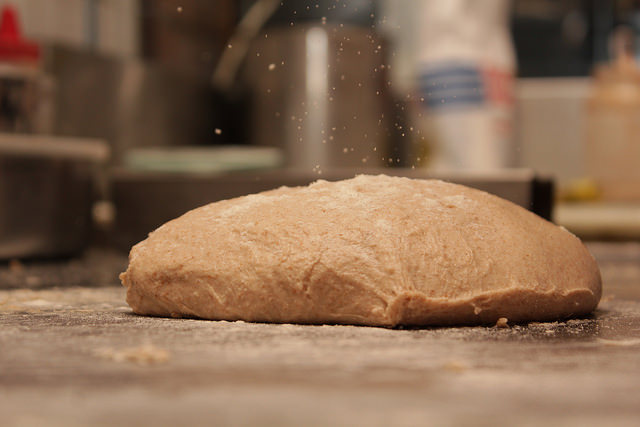I ate junk school lunches all throughout my childhood and never thought twice about it.
Every day, my mom packed in my lunch bag: a peanut butter and jelly sandwich on wheat bread, a sweet treat such as a Twinkie or Hostess, a bag of chips and a fruit flavored drink.
Looking back, it’s no wonder I couldn’t concentrate with that much sugar racing through my body or stay awake the second part of the day after the great sugar crash of fifth period. Nowadays, I compete as an ultra runner, thus considering my diet an integral part of my training.
My mindful eating habits began to change when I got out of my parent’s house and they’re still changing as I navigate the uncharted waters of my well-being.
I could never have imagined years ago where I would be today, but I believe that in general the whole world is slowly waking up to eating a healthier diet.
Here is how the transition evolved for me as easily as it could for you.
During my freshman year in college, I had a meal plan that allowed me to eat three meals a day at the school cafeteria. I had options but I usually chose high-calorie processed foods that came out of a fryer because I was playing rugby for my college team, thus trying to bulk up.
Then, one day at breakfast, I was reading a book by Tom Robbins called Another Roadside Attraction. The main character, John Paul Ziller, was a vegetarian and when asked why, he confessed he didn’t want to become a graveyard for dead animals. Those words and that image stuck with me for many years as I began looking at the food I was eating and how it affected the world around me.
Did I want to support a devilish high quantity, low quality meat phenomenon taking place around the world? No. So I went on to do research and watch vegetarian themed movies such as Vegetarian World, Meet Your Meat and The Future of Food which further supported my feelings and fed my curious mind.
For the first time in my life I was excited about choosing what I put into my body.
After graduating college I began my career as a cook and consciously decided to return to eating meat because that’s what I was cooking. I learned the preservatives in processed foods make them dangerous so I began limiting the processed meats other processed foods in my diet.
In Michael Pollen’s book, In Defense of Food, he explains how the individual parts of food cannot be separated without losing something essential. Therefore, the true genius and balance of whole food composition changes when it is processed. Often more sugar, salt and preservatives are needed to keep the food consistently shelf worthy. Even in the case of adding beneficial nutrients to a whole food, it is still unclear how well our bodies use it.
I began eating less sugar as my need for long distance running increased. Not all sweeteners are created equal. I now typically use honey, agave syrup and xylitol to sweeten foods without spiking my insulin levels. In addition to cutting back my sugar intake I have also been eating less wheat products, especially refined wheat. Wheat is not easy for our bodies to digest and only in the last several hundred years have our bodies adapted to eating wheat.
To compensate for my lack of calories in the processed foods, I eat a lot more raw foods including nuts, avocados, coconut, salad greens and vegetables in general. I’ve seen an increase in energy and efficiency throughout my life. My digestion improved, as did my appetite. I ate more modest meals because I was getting more out of food.
The GMO movement was put in my face when I moved to Hawaii—previously I had not even heard of GMO. Hawaii has become one of the world’s GMO testing grounds, but the results are still not out about just how bad it is for us. So my response to many of my favorite foods being re-engineered in the laboratory as GMO and unlabeled is that I have chosen to eat mostly organic food or I choose the “clean 15” which are not GMO and do not typically need pesticides or herbicides to grow.
The clean 15 include avocados, pineapples, cabbage, sweet peas, onions, asparagus, mangoes, papayas, kiwi, eggplant, grapefruit, cantaloupe, cauliflower and sweet potato.
I typically avoid eating the “dirty dozen” foods unless they are locally grown or organic. They includes apples, grapes, strawberries, snap peas, nectarines, peaches, spinach, potatoes, tomato, cucumber, blueberry, bell pepper and hot peppers which all typically require pesticides and herbicides to produce.
The last step in mindful eating is to cleanse the body and slowly begin reintroducing foods one by one into the diet to see how they affect our overall well-being. I believe everyone has certain foods that suite them well. We have to trust our bodies to show us what is right. Our bodies are great at adapting to changing circumstances but if we slow down and be mindful, there is no limit to how much we could learn.
Food science has done us more harm than good because their tests are subjective and their test subjects are not you. We can suffer greatly when we take any advice blindly.
Do your own research and find out for yourself what is good for you.
Over the course of the last 10 years as my diet has changed so has my lifestyle changed along with it. I now raise a portion of my food at home in my garden. I harvest wild foods including doves, fish and crabs. I forage for fruit which grows wild and abundant around our island. I raise my own chickens for eggs. I support other local farmers by purchasing their goods at farmers markets. I might not be able to change the world but I can be a part of the change.
And by changing the food I eat I can at least change my world.
It’s been 30 years since I was in grade school. Now my wife and I pack school lunches for our kids. Every day, our kids get something different, and never the same thing twice.
One example of a school lunch would be yogurt, organic carrot and celery sticks, nori sea weed strips and a chicken sandwich on 21 grain organic bread with sprouts, tomatoes, cucumber and cheese with fresh brewed caffeine free herbal tea to a drink.
Our children may only be seven but they know what is good for them already.
~
Relephant:
Mindful Eating for Weight Loss & Stress Reduction.
Author: Benjamin Prichard
Editor: Catherine Monkman
Photo: Rafael Neop/Flickr












Read 0 comments and reply